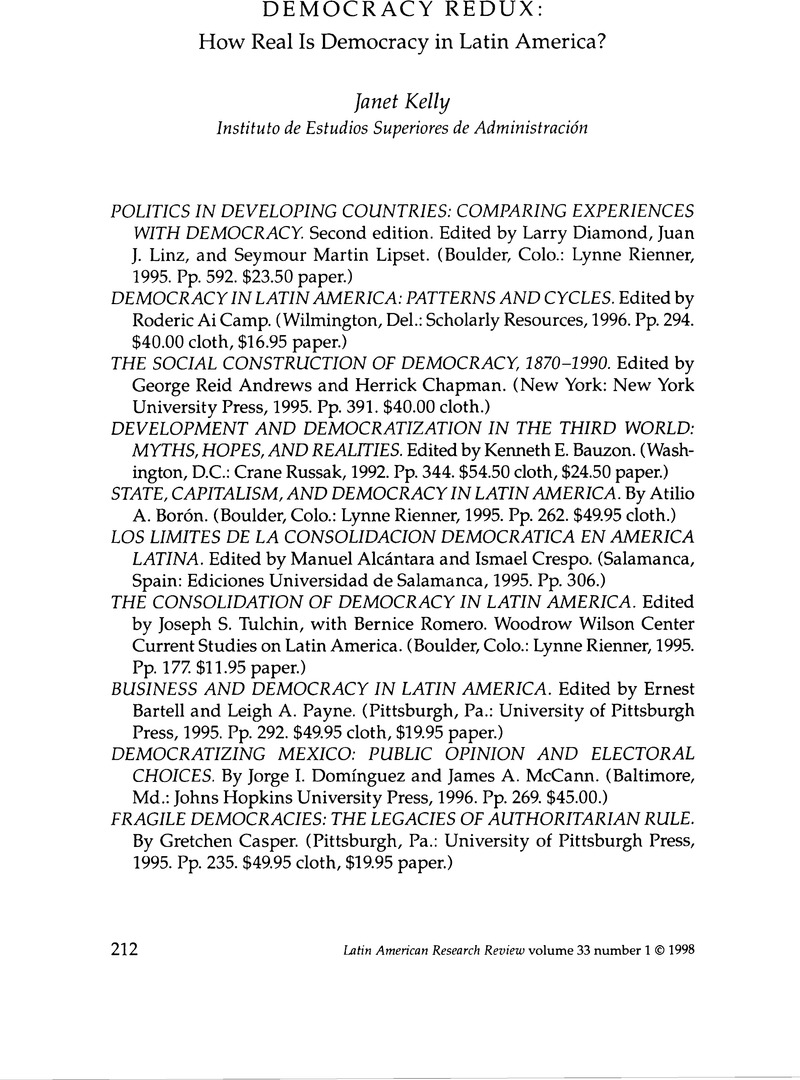Article contents
Democracy Redux: How Real Is Democracy in Latin America?
Review products
Published online by Cambridge University Press: 05 October 2022
Abstract

- Type
- Review Essays
- Information
- Copyright
- Copyright © 1998 by the University of Texas Press
References
Notes
1. Democracy in Developing Countries: Latin America, vol. 4, edited by Larry Diamond, Juan J. Linz, and Seymour Martin Lipset (Boulder, Colo.: Lynne Rienner, 1989). The essay is reprinted from Authoritarianism and Corporatism in Latin America, edited by James Malloy (Pittsburgh, Pa.: University of Pittsburgh Press, 1977).
2. Robert A. Dahl, Polyarchy: Participation and Opposition (New Haven, Conn.: Yale University Press, 1971).
3. Barrington Moore, Social Origins of Democracy and Dictatorship (Boston, Mass.: Beacon, 1966).
4. Dietrich Rueschemeyer, Evelyne Huber Stephens, and John D. Stephens, Capitalist Development and Democracy (Chicago, Ill.: Chicago University Press, 1992).
5. Transitions from Authoritarian Rule, edited by Guillermo O'Donnell, Philippe Schmitter, and Lawrence Whitehead (Baltimore, Md.: Johns Hopkins University Press, 1986).
6. The “dichotomy” between neoliberals and anti-state radicals should be viewed instead as a continuum with many distinctions. An important network of nongovernmental organizations that is loosely connected to free-market organizations in developed countries attracts garden-variety market reformers as well as more radical members. The subtle variations can be perceived in a book that recently came out all over Latin America, provocatively titled Manual del perfecto idiota latinoamericano, by Plinio Apuleyo Mendoza, Carlos Alberto Montaner, and Alvaro Vargas Llosa, with a prologue by Mario Vargas Llosa (Barcelona: Plaza and Janes, 1996). This work by journalists attempts to denigrate the traditional Left, which is characterized as idiotic in today's world. Each coauthor took responsibility for several portions, but it is not revealed who wrote which parts. Reading from chapter to chapter, an attentive reader will detect significant differences that, if debated in detail, might separate these author-friends on significant social issues.
7. Gabriel Almond and Sidney Verba, The Civic Culture: Political Attitudes and Democracy in Five Nations (Princeton, N.J.: Princeton University Press, 1963).
8. This last issue is taken up in Seguridad jurídica y competitividad, edited by María Eugenia Boza and Rogelio Pérez Perdomo (Caracas: Instituto de Estudios Superiores de Administración and Venezuela Competitiva, 1996).
- 3
- Cited by




